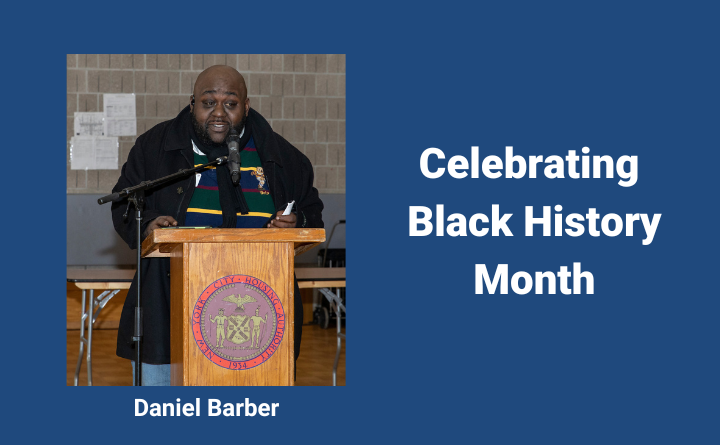Celebrating Black History Month
Meet Daniel Barber, CCOP Chair
During Black History Month, we are reminded of the opportunity that public housing has provided to countless families since its foundation and its role in fostering a society that is more fair and just. We spoke with Daniel Barber, Chair of the Citywide Council of Presidents (CCOP) and Resident Association President of Jackson Houses, to get his thoughts on NYCHA, his long-time advocacy for NYCHA residents, and what the future may bring.
How long have you been a NYCHA resident?
Since August of 1972. I was 3 years old when my entire family moved to NYCHA. We had to move from our housing, and the City gave us three choices; my mom and aunt chose Jackson Houses, and we’re still in the same units we had when we first moved in. We were four blocks away from where we used to live so it didn’t uproot us out of our community. It allowed us to keep the community ties that our elders and parents experienced and wanted for us.
Can you share a favorite memory of living at your development?
My favorite memory was to come outside in the summertime and see the different basketball tournaments. We had the crème de la crème of street ball. There were so many stars who grew up in public housing and others that visited developments where basketball was a highlight. Andrew Jackson was one of those places. To come outside and see people flying through the air was very entertaining. We used to look forward to the weekends and going early to grab our spots. That was one of the greatest moments growing up in the community as a kid.
Why did you want to become an RA president?
There was a time in my life when I was in the wrong place at the wrong time and was in a bad situation. I asked God if he got me out of that situation, I’d do whatever he wanted me to do. At one point in my life, I was going to school at the Salvation Army to become a minister, but I left. After my situation, I wanted to serve Him and only Him. He didn’t want me to be of the streets, but he needed me to do work in the streets…to continue to work with young people to give them the right guidance, stop the young men of color from being incarcerated, to know that Black lives should matter at all times.
I became RA president almost 22 years ago and never looked back. He kept his end of the promise and I had to keep mine.
One way Black/African American people have empowered themselves and their communities is by advocating for “a seat at the table” in the conversation regarding issues and policies. You’ve been an activist on behalf of NYCHA residents for a long time; tell us about some of your proudest accomplishments on behalf of NYCHA residents?
I’ve been on the CCOP since 2018. We advocate for residents. We exercised our rights, and it got us federal monitor Bart Schwartz, it got us Daniel Sherrod. HUD regulation 24 CFR Part 964 automatically gave us a seat the table to be involved, but in the past NYCHA wasn’t adhering to it. The [CCOP’s advocacy] was where the table was built and the Memorandum of Agreement (MOA) that CCOP worked on with the bylaws after truly solidified it. The MOA was like the shellac that’s protecting the table to give it longevity. We are at the table, and we are an equal partner.
CCOP is here to let NYCHA know that the voice of public housing residents is so strong and we’re so many. We’re pushing to become that unified voice.
Who is your inspiration?
There were several influences in my life. First and foremost is God. Without God there would be no me. My parents Dan Walker and Janie Barber. They instilled God’s ethics and morals in all their children.
John Rondon from the Salvation Army taught me business and how to run an operation. He prepared me to run a fortune 500 company with my eyes closed. Stephen Langford from the Salvation Army – not only did he train me, but he also treated me as if I was family. They taught me about the mission to give your heart to God and your hand to man.
My high school coach Joseph Prezioso. Coach was really the dad of DeWitt Clinton High School. He wouldn’t let us stray from the being the men and women he knew we could be. He fine-tuned the attributes of each individual that came into his presence to make you the man or the woman that you are today. I love him and miss him.
What do you think the NYCHA of tomorrow looks like?
My future NYCHA is for it to remain public housing and not be a private entity. For NYCHA to get the necessary funding from the necessary people at that the necessary rate it needs to be funded. You can’t keep telling young people that they’re the future but you’re not leaving them a future to fight for.
Anything else you’d like to tell readers about yourself?
I do what I do because it’s the right thing to do and because it’s what God wants me to do. I love what I do because it makes me feel good at the end of the day that I was able to assist someone.
I strongly feel that if residents come together, we can save public housing, which gave so many of us the opportunity to have a place to call home. The people only want better; and sometimes to receive better, you have to receive change.







